|
|
Every summer, thousands of people depart UC Davis. Most are graduating students, but summer is a common season for retirements too, and this year that group includes Jan Conroy. He spent nearly 40 years at UC Davis, first as a student (class of 1977, bachelor’s degree in design) and then as an employee. His final job was executive director for University Communications. He saw countless changes and presided over some, particularly in publications and especially in the UC Davis Magazine. He helped design the first issue in 1983 and has contributed to every issue since. It reaches more than 230,000 people, making it easily the largest publication to come out of Davis. On Davisville today we talk about the changes during his long career as an Aggie, at the campus, in media, and in Davis itself, where he lived for several years before enrolling at UC Davis.
|
 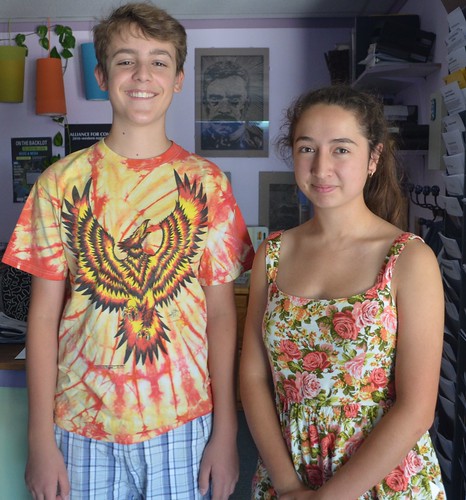 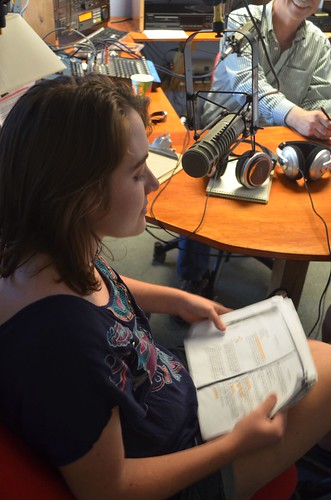 Summers are busy for Acme Theatre Co., the Davis nonprofit run by high school students that promotes “serious theater, for the fun of it.” In August the 31-year-old troupe is staging Treasure Island, plus its annual By The Seat of Our Pants, the set of short plays they write, stage and present in 36 hours. You can detect the “serious fun” DNA in this interview with four members of Acme: Jake Kelly and Margaret Starbuck, center, who talk about the play, Acme itself, and related topics: and Eden Tomich, far left, and Emmett Barnes, who read a scene from Treasure Island for Davisville. Tomich plays lead character Jim Hawkins. Barnes plays Ben Gunn, a marooned pirate unhinged by years of isolation. Tomich and Barnes recorded the scene in one take; you can hear it about halfway in. You might think you're hearing more than two voices, but you're not. Summers are busy for Acme Theatre Co., the Davis nonprofit run by high school students that promotes “serious theater, for the fun of it.” In August the 31-year-old troupe is staging Treasure Island, plus its annual By The Seat of Our Pants, the set of short plays they write, stage and present in 36 hours. You can detect the “serious fun” DNA in this interview with four members of Acme: Jake Kelly and Margaret Starbuck, center, who talk about the play, Acme itself, and related topics: and Eden Tomich, far left, and Emmett Barnes, who read a scene from Treasure Island for Davisville. Tomich plays lead character Jim Hawkins. Barnes plays Ben Gunn, a marooned pirate unhinged by years of isolation. Tomich and Barnes recorded the scene in one take; you can hear it about halfway in. You might think you're hearing more than two voices, but you're not.
|
 The Davis School Board eventually chose a smaller number, but for several weeks board member Richard Harris galvanized the town—at least, the part that pays attention to Davis schools and taxes—with his proposal to place a parcel tax of up to $642 per year on the local ballot this November. That’s at least two times larger than any schools tax previously approved in Davis, including the one voters endorsed just a few months ago. The board opted instead for a November tax measure of up to $446. But the issues that drove Harris to suggest the higher figure still apply, and on today's Davisville he explains how he came up with $642; what it would pay for; why he thinks it’s necessary; and how it connects to the statewide tax initiative also appearing on the fall ballot (if it passes, this tax shrinks). He’s not seeking re-election, and the discussion wraps up with his advice to whoever succeeds him. And yes, he really believes that in Davis, a $642 tax could have passed. The Davis School Board eventually chose a smaller number, but for several weeks board member Richard Harris galvanized the town—at least, the part that pays attention to Davis schools and taxes—with his proposal to place a parcel tax of up to $642 per year on the local ballot this November. That’s at least two times larger than any schools tax previously approved in Davis, including the one voters endorsed just a few months ago. The board opted instead for a November tax measure of up to $446. But the issues that drove Harris to suggest the higher figure still apply, and on today's Davisville he explains how he came up with $642; what it would pay for; why he thinks it’s necessary; and how it connects to the statewide tax initiative also appearing on the fall ballot (if it passes, this tax shrinks). He’s not seeking re-election, and the discussion wraps up with his advice to whoever succeeds him. And yes, he really believes that in Davis, a $642 tax could have passed.
|
 The second floor of Court ’N Cedar on G Street near Third has been one of downtown's neglected corners, but that’s changing. On Davisville this week, Michael Bisch, co-president of the Davis Downtown Business Association, and artist Marieke de Waard discuss the Open Door Art Studios now taking shape at that location. Based on the Torpedo Factory near Washington, D.C., Open Door seeks to turn a sleepy downtown upstairs into an artists’ hangout, where artists can rent space (this photo shows one of the studios) and work among their peers, and the public can observe and engage the artists. With some work, the downstairs courtyard could become a performance venue. The venture is part art, part economics, and part public attraction—and the latest example of how commerce and art can interact to support downtown Davis. The second floor of Court ’N Cedar on G Street near Third has been one of downtown's neglected corners, but that’s changing. On Davisville this week, Michael Bisch, co-president of the Davis Downtown Business Association, and artist Marieke de Waard discuss the Open Door Art Studios now taking shape at that location. Based on the Torpedo Factory near Washington, D.C., Open Door seeks to turn a sleepy downtown upstairs into an artists’ hangout, where artists can rent space (this photo shows one of the studios) and work among their peers, and the public can observe and engage the artists. With some work, the downstairs courtyard could become a performance venue. The venture is part art, part economics, and part public attraction—and the latest example of how commerce and art can interact to support downtown Davis.
|
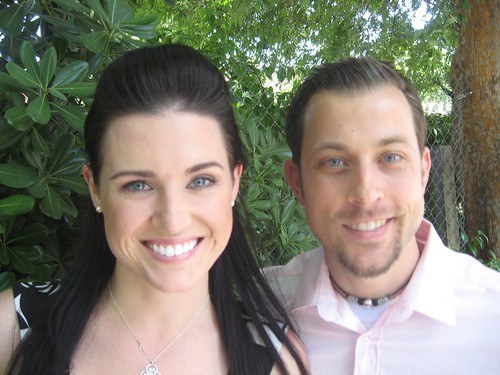 Among social media, Twitter has less impact than Facebook, but is much more than just another online flavor of the month. A recent Pew Internet/American Life Project study says 8 percent of Americans use Twitter daily. If that ratio holds true for Davis, then we’ve got more than 5,000 daily tweeters in our town. The guests for today’s show, Danielle DeBow (who works for Nugget Market) and Blake Cooper (employed at UC Davis), have started Davis TweetUp, which “connects Davis professionals in support of local businesses and our community.” On Davisville they explain what that means, the different ways they use Twitter themselves, and how it all ties in to Davis. Among social media, Twitter has less impact than Facebook, but is much more than just another online flavor of the month. A recent Pew Internet/American Life Project study says 8 percent of Americans use Twitter daily. If that ratio holds true for Davis, then we’ve got more than 5,000 daily tweeters in our town. The guests for today’s show, Danielle DeBow (who works for Nugget Market) and Blake Cooper (employed at UC Davis), have started Davis TweetUp, which “connects Davis professionals in support of local businesses and our community.” On Davisville they explain what that means, the different ways they use Twitter themselves, and how it all ties in to Davis.
|
Today on Davisville we talk about Measure D, a parcel tax renewal on the city’s June ballot that would raise $1.37 million per year for parks maintenance in Davis. It is the second tax measure in the city this year, the first being the school tax that voters approved in March. The guests are Charlie Russell, a local businessman and chair of the city Recreation and Park Commission, and David Luckscheider, park manager for the city. Among other subjects, we look at why the city kept the rate at $49 per house, how the city ended up supporting park maintenance this way, and what the money pays for. |
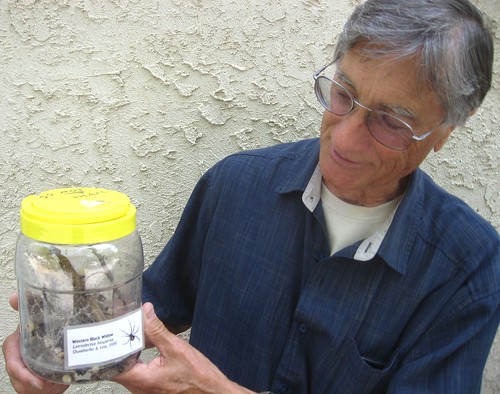 Today’s Davisville looks at spiders in Davis and Yolo County, with a focus on the Explorit Science Center’s “Spiders in Your World” community science project for 2012. Explorit board President Lars Anderson—pictured here with a properly capped black widow display jar—explains why they chose this project and what they want to accomplish. Of course, we talk about the little carnivores too. Spiders are never far away. Nor have we discovered more than a fraction of the types that exist in the world. Explorit hopes to conduct solid research on spiders in Yolo County by enlisting the public, all while acquainting us with the roles spiders play beyond lurking in the corners of garages. The project includes attitude surveys, home experiments, and a website for posting spider sightings. Today’s Davisville looks at spiders in Davis and Yolo County, with a focus on the Explorit Science Center’s “Spiders in Your World” community science project for 2012. Explorit board President Lars Anderson—pictured here with a properly capped black widow display jar—explains why they chose this project and what they want to accomplish. Of course, we talk about the little carnivores too. Spiders are never far away. Nor have we discovered more than a fraction of the types that exist in the world. Explorit hopes to conduct solid research on spiders in Yolo County by enlisting the public, all while acquainting us with the roles spiders play beyond lurking in the corners of garages. The project includes attitude surveys, home experiments, and a website for posting spider sightings.
|
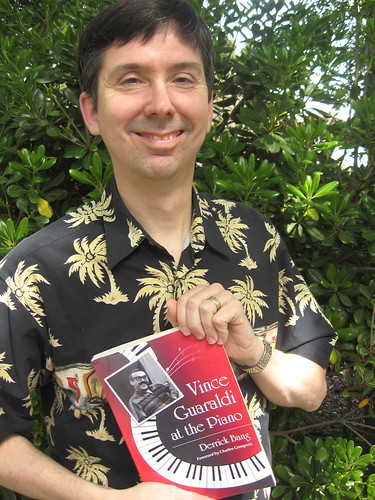  San Francisco jazz pianist Vince Guaraldi (right, with characteristic handlebar moustache) wrote music for “Peanuts” specials, influenced countless musicians, and created one of the top-selling Christmas records ever (“A Charlie Brown Christmas”), but in-depth appraisals of his career are scarce. Davis author Derrick Bang has fixed that with “Vince Guaraldi at the Piano,” an account of Guaraldi and his music. Bang holds a copy of his book, left. Guaraldi, who performed in Davis in 1963 and 1972, died of a heart attack at 47 in 1976. San Francisco jazz pianist Vince Guaraldi (right, with characteristic handlebar moustache) wrote music for “Peanuts” specials, influenced countless musicians, and created one of the top-selling Christmas records ever (“A Charlie Brown Christmas”), but in-depth appraisals of his career are scarce. Davis author Derrick Bang has fixed that with “Vince Guaraldi at the Piano,” an account of Guaraldi and his music. Bang holds a copy of his book, left. Guaraldi, who performed in Davis in 1963 and 1972, died of a heart attack at 47 in 1976.
|
|
|



 Summers are busy for
Summers are busy for  The Davis School Board eventually chose a smaller number, but for several weeks board member Richard Harris galvanized the town—at least, the part that pays attention to Davis schools and taxes—with his proposal to place a parcel tax of up to $642 per year on the local ballot this November. That’s at least two times larger than any schools tax previously approved in Davis, including the one voters endorsed just a few months ago. The board opted instead for a
The Davis School Board eventually chose a smaller number, but for several weeks board member Richard Harris galvanized the town—at least, the part that pays attention to Davis schools and taxes—with his proposal to place a parcel tax of up to $642 per year on the local ballot this November. That’s at least two times larger than any schools tax previously approved in Davis, including the one voters endorsed just a few months ago. The board opted instead for a  The second floor of Court ’N Cedar on G Street near Third has been one of downtown's neglected corners, but that’s changing. On Davisville this week, Michael Bisch, co-president of the Davis Downtown Business Association, and artist Marieke de Waard discuss the Open Door Art Studios now taking shape at that location. Based on the Torpedo Factory near Washington, D.C., Open Door seeks to turn a sleepy downtown upstairs into an artists’ hangout, where artists can rent space (this photo shows one of the studios) and work among their peers, and the public can observe and engage the artists. With some work, the downstairs courtyard could become a performance venue. The venture is part art, part economics, and part public attraction—and the latest example of how commerce and art can interact to support downtown Davis.
The second floor of Court ’N Cedar on G Street near Third has been one of downtown's neglected corners, but that’s changing. On Davisville this week, Michael Bisch, co-president of the Davis Downtown Business Association, and artist Marieke de Waard discuss the Open Door Art Studios now taking shape at that location. Based on the Torpedo Factory near Washington, D.C., Open Door seeks to turn a sleepy downtown upstairs into an artists’ hangout, where artists can rent space (this photo shows one of the studios) and work among their peers, and the public can observe and engage the artists. With some work, the downstairs courtyard could become a performance venue. The venture is part art, part economics, and part public attraction—and the latest example of how commerce and art can interact to support downtown Davis. Among social media, Twitter has less impact than Facebook, but is much more than just another online flavor of the month. A recent Pew Internet/American Life Project study says 8 percent of Americans use Twitter daily. If that ratio holds true for Davis, then we’ve got more than 5,000 daily tweeters in our town. The guests for today’s show, Danielle DeBow (who works for Nugget Market) and Blake Cooper (employed at UC Davis), have started Davis TweetUp, which “connects Davis professionals in support of local businesses and our community.” On Davisville they explain what that means, the different ways they use Twitter themselves, and how it all ties in to Davis.
Among social media, Twitter has less impact than Facebook, but is much more than just another online flavor of the month. A recent Pew Internet/American Life Project study says 8 percent of Americans use Twitter daily. If that ratio holds true for Davis, then we’ve got more than 5,000 daily tweeters in our town. The guests for today’s show, Danielle DeBow (who works for Nugget Market) and Blake Cooper (employed at UC Davis), have started Davis TweetUp, which “connects Davis professionals in support of local businesses and our community.” On Davisville they explain what that means, the different ways they use Twitter themselves, and how it all ties in to Davis. Today’s Davisville looks at spiders in Davis and Yolo County, with a focus on the Explorit Science Center’s “Spiders in Your World” community science project for 2012. Explorit board President Lars Anderson—pictured here with a properly capped black widow display jar—explains why they chose this project and what they want to accomplish. Of course, we talk about the little carnivores too. Spiders are never far away. Nor have we discovered more than a fraction of the types that exist in the world. Explorit hopes to conduct solid research on spiders in Yolo County by enlisting the public, all while acquainting us with the roles spiders play beyond lurking in the corners of garages. The project includes attitude surveys, home experiments, and a website for posting spider sightings.
Today’s Davisville looks at spiders in Davis and Yolo County, with a focus on the Explorit Science Center’s “Spiders in Your World” community science project for 2012. Explorit board President Lars Anderson—pictured here with a properly capped black widow display jar—explains why they chose this project and what they want to accomplish. Of course, we talk about the little carnivores too. Spiders are never far away. Nor have we discovered more than a fraction of the types that exist in the world. Explorit hopes to conduct solid research on spiders in Yolo County by enlisting the public, all while acquainting us with the roles spiders play beyond lurking in the corners of garages. The project includes attitude surveys, home experiments, and a website for posting spider sightings.
 San Francisco jazz pianist Vince Guaraldi (right, with characteristic handlebar moustache) wrote music for “Peanuts” specials, influenced countless musicians, and created one of the top-selling Christmas records ever (“A Charlie Brown Christmas”), but in-depth appraisals of his career are scarce. Davis author Derrick Bang has fixed that with “Vince Guaraldi at the Piano,” an account of Guaraldi and his music. Bang holds a copy of his book, left. Guaraldi, who performed in Davis in 1963 and 1972, died of a heart attack at 47 in 1976.
San Francisco jazz pianist Vince Guaraldi (right, with characteristic handlebar moustache) wrote music for “Peanuts” specials, influenced countless musicians, and created one of the top-selling Christmas records ever (“A Charlie Brown Christmas”), but in-depth appraisals of his career are scarce. Davis author Derrick Bang has fixed that with “Vince Guaraldi at the Piano,” an account of Guaraldi and his music. Bang holds a copy of his book, left. Guaraldi, who performed in Davis in 1963 and 1972, died of a heart attack at 47 in 1976.